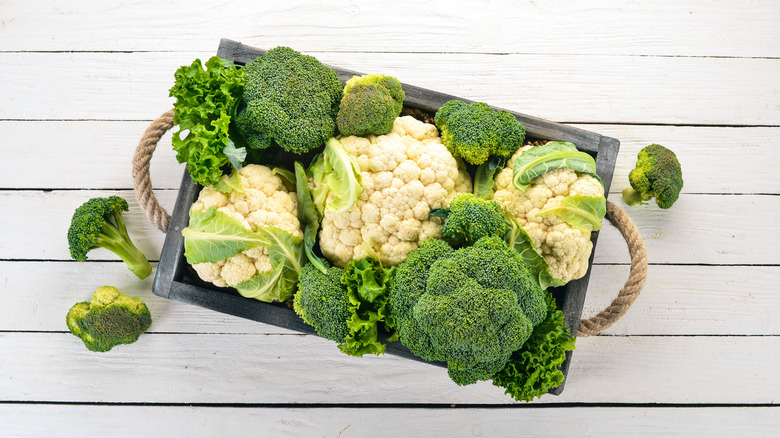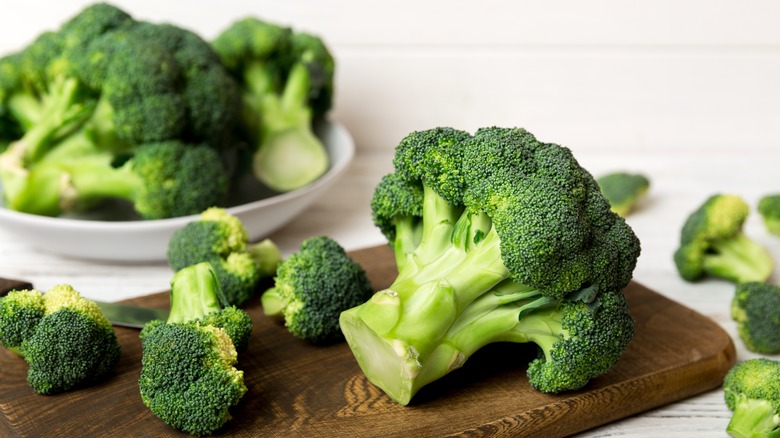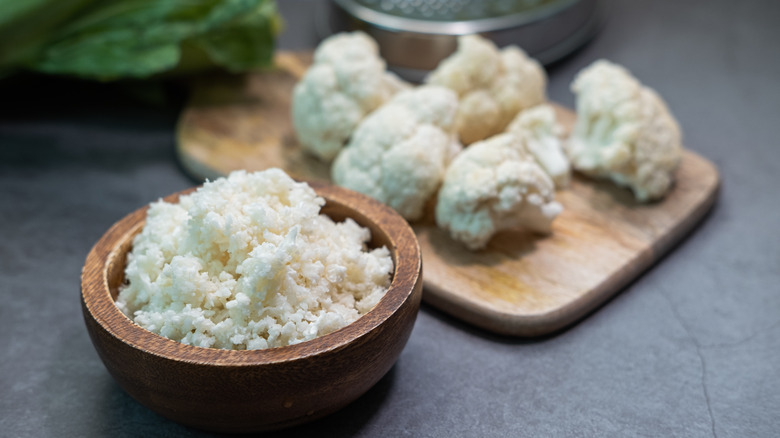Is There A Nutritional Difference Between Broccoli And Cauliflower?
Cauliflower has earned its place as a popular player in recent years, thanks to its versatility as a low-carb swap-in. The hearty white vegetable has proved to be a worthy substitute for rice and has been molded into pizza crusts. It's also tasty when it's diced, roasted, or the base of a soup, but so is its green counterpart, broccoli. Even though cauliflower has gained popularity in recent years, broccoli has seemed to hold the crown as everyone's favorite vegetable.
Although they have their differences, the two vegetables share a shelf at the grocery store, a section on crudité trays, and are interchangeable to most when dipped in ranch or added to a veggie medley. They're similar in shape and size, yet glaringly different in color and slightly distinct in taste. All in all, they're pretty similar regarding culinary applications.
When it comes to nutrition, they are neck and neck in many important values, but there are some slight differences between the two beloved heads. Does one of these cruciferous cousins take the lead and go home with the garland of roses?
Broccoli nutrition
In terms of the basic macronutrients, the USDA lists one cup of chopped raw broccoli as containing just over 6 grams of carbohydrates, a trace amount of fat, and 2.57 grams of protein. One cup of broccoli only has 30.9 calories and boasts 2.37 grams of fiber, which is about 10% of your daily value, depending on how many calories you consume, according to Livestrong.
When it comes to vitamins and minerals, just half a cup contains about 70% of your daily value for vitamin C, per Healthline. Broccoli is also high in Vitamin K1, which aids blood clotting and bone health.
Broccoli is almost 90% water and very low in calories, but certainly doesn't skimp on antioxidants and compounds such as carotenoids, quercetin, and sulforaphane, which has been linked to cancer prevention — as well as that distinct taste of cruciferous veggies like broccoli, cauliflower, Brussels sprouts, and kale.
Nutritional differences
In terms of basic macronutrients for cauliflower, the difference with broccoli is negligible when you compare it through the USDA. One cup of chopped raw cauliflower contains a slightly lower amount of carbohydrates, 5.32 grams, a trace amount of fatty acids, and 2.05 grams of protein. It is also marginally lower in calories at 26.8 per cup versus broccoli's 30.9.
The main difference between the two contenders lies in the details. Raw broccoli contains 28.2 micrograms of vitamin A, while cauliflower has none. Broccoli has nearly twice as much vitamin C as its ghost counterpart for the equivalent amount. The green crown blows cauliflower out of the water with its vitamin K content, with 92.8 micrograms compared to 16.6 micrograms, respectively.
So, it looks like the mighty green giant broccoli takes the lead in a photo finish. However, filling up your plate with either crown is a nutritional win.


